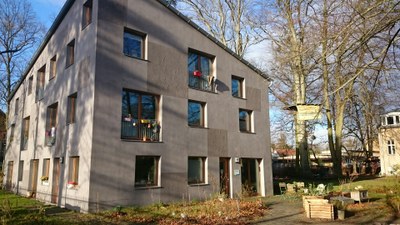Housing as a Global Urban Commons. Strategies and Networks for the Transnational Mobilization of Alternative Housing Policies


Projekthaus Potsdam (Housing project, Mietshäuser Syndikat) International meeting of the Mietshäuser Syndikat, 2017
In response to the increasing shortage of affordable housing, numerous local protest movements and networks of alternative housing models have been emerging over the past years. The ideas of these housing movements circulate globally; they influence each other and intervene in terms of global urban commons in housing policy decisions, temporarily or in the long term. However, to date, very little is known about not only local but multiscalar networking processes of urban social movements in general and housing movements in particular. At this point, there is an interesting research gap emerging regarding the local and at the same time transnational networks and mobilization of practices and actors in the frame of so-called housing commons.
In order to close this research gap, the research project analyzes the actors, practices, causes and impact of globally circulating alternative approaches to housing and related multiscalar networks. Conceptually, we discuss housing as an urban commons and apply two theoretical strands: mobile policies (cf. McCann/Ward 2012) and network theory (cf. Nicholls/Miller/Beaumont 2013; Della Porta/Diani 2006). Empirically, the study focuses on multiscalar strategies of housing commoning by means of four examples from European countries:
First, it examines de-commodified, self-managed housing forms that have spread transnationally:
- Mietshäuser Syndikat in Germany and international networks (e.g. Austria, Netherlands)
- Community Land Trusts in England
Second, it explores examples of new housing movements:
- PAH (platform of mortgage creditors) in Spain
- European Action Coalition for the Right to Housing and to the City
Methodologically, the project relies on an analysis of relational situations by means of problem-centered interviews with key activists and speakers of intermediary institutions such as NGOs, and participant observations at network meetings, etc. These methods constitute the basis for a qualitative network analysis, which serves to examine the networks of the commoners and how they mobilize their strategies. In addition to that, we conduct expert interviews with speakers from city administrations, among others.
By taking a relational-comparative perspective, this project seeks to provide insights into the functioning and impact of the transnational diffusion of alternative approaches to housing and associated networks of social movements in different societal contexts. By means of that, this investigation intends to make an important contribution to the research on networks and mobile policies of urban social movements. Moreover, the study is of high sociopolitical importance for the housing question which has again become meaningful today.
Funding: German Research Foundation – DFG 2017-2021
For further information concerning the project please contact:
Dr. Corinna Hölzl (project manager) corinna.hoelzl@geo.hu-berlin.de
